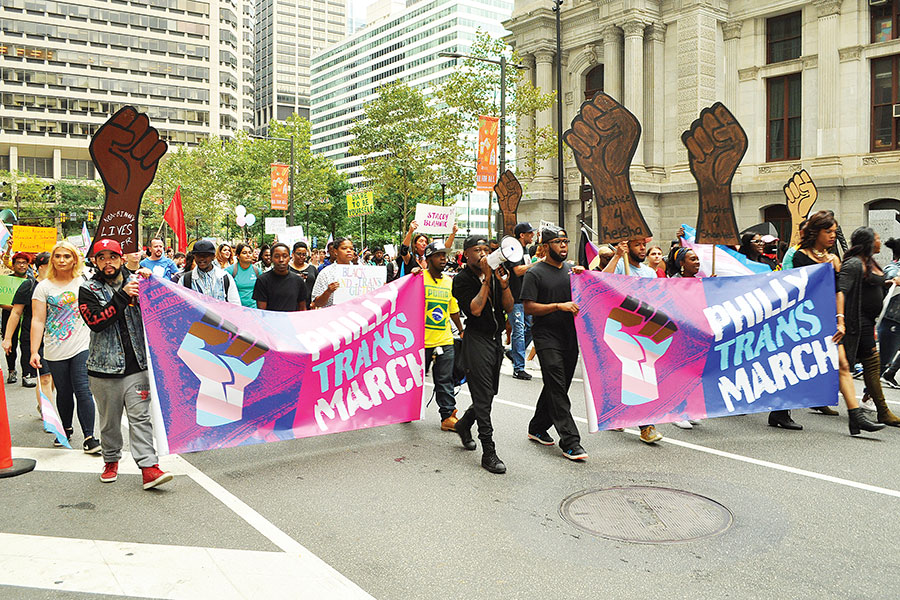In the wake of the recent murder of Shantee Tucker, more than 200 participants took part in the Philly Trans March in honor of the community and the hundreds of other trans people killed over the last decade.
Transgender community members and supporters gathered Oct. 6 at LOVE Park. Led by police escorts, they marched down Broad Street as drivers honked in support and curious spectators took photos.
Christian Lovehall and other PTM organizers led the brigade alongside Tucker’s family, who held a banner displaying her pictures under the caption: “In memory of our sweet angel Shantee.”
Leona Bibbs, Tucker’s aunt, held one end of the banner, shouting “Our streets!” in response to Lovehall’s “Whose streets?”
“Our family isn’t the only one that’s having to deal with fatally losing a trans family member,” Bibbs told a PGN reporter during the march. “That’s why we’re out here, fighting for Shantee and other members of the trans community. I see these murders happening and it lets me know that more needs to be done to support the trans community.”
The crowd also chanted, “No justice, no peace, no transphobic police” and “We’re here, we’re queer, we’re fabulous, don’t fuck with us,” while holding up various signs, including, “Dismantle the cis-tem,” “Black Trans Lives Matter” and “Trans men are men, period.”
Lovehall organized the first Philly Trans March in 2011, a year after the murder of local trans woman Stacey Blahnik — which remains unsolved and, he said, still haunts him. Now the activist also is seeking justice for Tucker, who was gunned down Sept. 5 on Old York Road near Hunting Park Avenue.
“The fact that we’re still marching for the same thing eight years later is not comforting,” said Lovehall, who also coordinates GALAEI’s Trans Equity Project. “This isn’t a celebratory thing for me. A lot of people are saying, ‘Congratulations on eight years,’ but I wish we could’ve stopped after the first one. People are starting to wake up, but trans women of color are still getting murdered in this city and around the country.”
Lovehall said he plans to leave PTM’s organizational duties in the community’s hands so he can focus on his music career and other projects, adding he hopes the momentum will continue.
Malik Moorer, who was in a relationship with Blahnik when she was murdered, spoke at the march about grieving his partner’s death and being investigated as a suspect in her murder.
“That was a hard time for me, and I’m still filled with anxiety whenever I come back to the city,” he told the crowd before the march. “I had to leave Philadelphia to regroup. I still feel the hurt and the pain, but I’m dealing with it a little better.”
Moorer, who now lives in Atlanta, added that Philadelphia is seeking to portray itself as “a little more trans-friendly” than in the past, but that “statistics say otherwise.”
Other PTM organizers and community members also addressed participants, advocating for support and honoring victims. Organizers said that at least 22 trans murders, including Tucker, have been reported nationwide this year. In Philadelphia, Tucker is one of more than a half-dozen known transgender women of color to be killed in recent years. While there have been arrests and convictions in the murders of Londyn Kiki Chanel, Maya Young and Diamond Williams, the cases of Nizah Morris, Kyra Cordova, Stacey Blahnik and Keisha Jenkins remain unsolved.
The march ended where it began — in front of the LOVE statue — when a woman got on stage, took hold of the microphone and said: “Out of respect for God, trans people should only use their own bathrooms.” The crowd booed.
“That’s why we continue to fight for our right to exist,” said PTM participant Margaret O’Reilly, who identifies as nonbinary. “We’re putting our voices and bodies on the line to let those people who tell us what bathroom we should be using or those who kill us for simply existing that we’re resilient and we won’t be silenced.”

